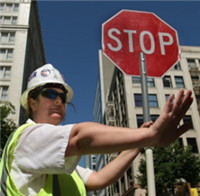By: Matt McCreery
Do you feel that the motoring public is out to get you? That if you don't hop out of the way quickly enough, they will run you down? It is probably because many drivers take the attitude that we should see them and keep out of their path. That’s just one of the hazards of flagging traffic. When f lagging traffic, we want to do everything we can to prevent an accident. Because when an accident occurs, everyone suffers: the motorist, our Company, and us. An accident can mean damaged vehicles and equipment, personal injury, and fatalities.
SIGNS CAN'T THINK
Signs normally do a good job of giving messages or direction. But they have one disadvantage. They can't think. And if a situation changes suddenly, our signs can't automatically adjust. That is where we come in. A flag person is used where conditions are constantly changing and traffic instructions must change, too. For traffic control to be effective, the job has to be set up properly. We need to make sure that the necessary plans, procedures, and training are in place before the job begins. There are many considerations to be made when setting up a flagger site and they all need to be weighed so that safety is paramount. A simple example is placing signs in advance to warn motorists they are entering a construction area, and to let them know that a flag person will be giving directions. There also needs to be plans in place for emergency vehicle traffic, road conditions, set-up, etc.
MAKE SURE THEY SEE YOU 
Motorists will be looking for the promised flag person, and should be able to spot you quickly. That is one reason you wear a fluorescent vest. So you will stand out. But let's not defeat its purpose. You shouldn’t let a bunch of other employees gather around you, so that you can't be seen at all. Or what do you suppose motorists think when they come upon a whole group of us waving our arms, all of us directing various pieces of construction equipment and no one directing the driver? Sometimes motorists find two persons giving them conflicting directions. We can avoid such situations by following these few basic rules:
-
As a flag person, you should understand what our operation involves, so that you know what to anticipate when directing traffic.
-
You should be properly dressed and neat in appearance. Foot wear is important. Remember that pavement can get mighty hot or cold, depending on the weather. Sturdy shoes or boots are advisable.
-
Depending on state requirements, paddles or flags of the correct size must be used. Flags should be at least 24" square.
-
There is only one right way to signal traffic, while there are many wrong ways. We all should be using one standardized set of signals.
-
Only designated flag persons should be directing traffic, except in emergency situations. These individuals must be alert to traffic conditions and the construction operations at all times.
-
Never turn your back on traffic. Many a flag person has been knocked for a loop.
-
Flag persons should be firm but courteous with the public at all times. The general public could well form an opinion of the construction industry as a whole by the impression they receive from you.
THEIR HIGHWAY
Always remember that it's the public's high-way, not the Company's. So, we do want to be courteous. But at the same time, we want to make sure that an accident doesn't happen. We may have to be especially firm with some motorists to keep them from hurting themselves or others. Being a flag person is a very important job, because you have the responsibility of protecting the public, your fellow workers, and yourself.
Related Topics: Flagging Traffic, Safety Articles, Monthly Safety Topics